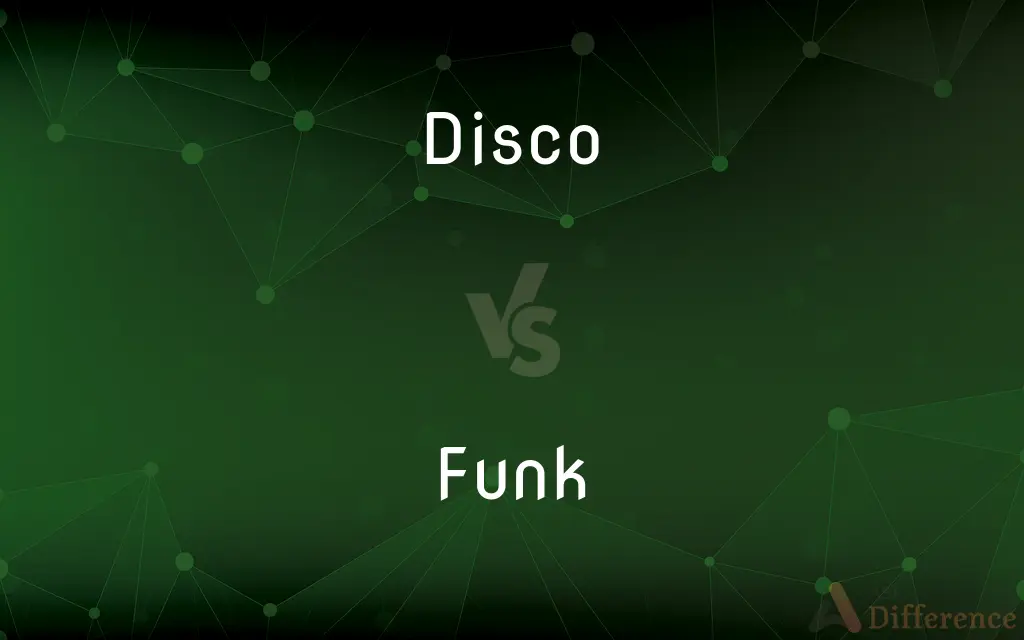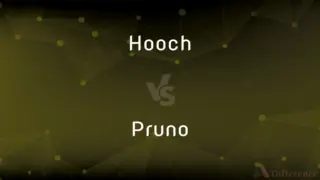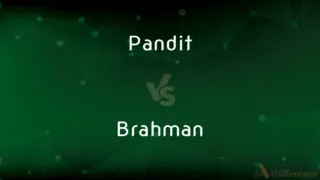Disco vs. Funk — What's the Difference?
Edited by Tayyaba Rehman — By Maham Liaqat — Updated on April 4, 2024
Disco is a genre of dance music with a steady four-on-the-floor beat, while funk is characterized by a rhythmic groove with emphasis on the bass line and drum beats.

Difference Between Disco and Funk
Table of Contents
ADVERTISEMENT
Key Differences
Disco music, emerging in the 1970s, is known for its upbeat, danceable rhythms, prominent basslines, and orchestral elements like string sections and horns. It often features smooth production and was associated with nightclubs and the dance culture. Funk, originating in the mid-1960s, emphasizes a strong rhythmic groove of drums and electric bass guitar, often accompanied by electric guitars, keyboards, and brass instruments, with less emphasis on melody and harmony but a focus on the complex rhythms and improvisation.
The lyrical themes of disco often revolve around love, freedom, and the dancefloor experience, aiming to create an escapist atmosphere for the listener. Funk lyrics, while sometimes addressing similar themes of love and relationships, often delve into social and political issues, reflecting the genre's roots in African American culture and its connection to the civil rights movement.
Disco's production tends to be polished, with an emphasis on melody and a seamless flow intended for continuous dancing. Funk production values the rawness of the instrumental performance, highlighting the skills of the musicians, particularly in the rhythm section, and often incorporates breaks and solos that emphasize the groove.
The disco era peaked in the late 1970s, symbolized by movies like "Saturday Night Fever" and hit songs that dominated charts worldwide. Although its popularity waned in the early 1980s, its influence persists in modern dance music. Funk continued to evolve, contributing significantly to the development of genres like hip-hop, R&B, and modern soul music, with its emphasis on beat and rhythm laying the groundwork for much of contemporary music.
Despite their distinct characteristics, both disco and funk have contributed to the evolution of dance music, influencing a wide range of genres and artists. Their legacy can be heard in contemporary music, where the blend of electronic production and rhythmic complexity continues to move audiences around the world.
ADVERTISEMENT
Comparison Chart
Origin
1970s
Mid-1960s
Key Features
Four-on-the-floor beat, orchestral elements, smooth production.
Rhythmic groove, emphasis on bass line and drum beats, improvisation.
Themes
Love, freedom, dancefloor.
Social and political issues, love, relationships.
Production
Polished, melody-focused.
Raw, rhythm-focused.
Influence
Modern dance music, pop.
Hip-hop, R&B, soul music.
Compare with Definitions
Disco
1970s Nightlife.
Disco was the soundtrack of 1970s nightclub culture.
Funk
Groove-Centric.
Funk music focuses on creating a deep rhythmic groove.
Disco
Dance-Oriented.
Disco's steady beat makes it perfect for dancefloors.
Funk
Instrumental Skill.
Funk emphasizes the musicians' skill, especially in the rhythm section.
Disco
Influence on Pop.
Disco's influence is evident in many contemporary pop songs.
Funk
Social Commentary.
Funk lyrics often reflect social and political themes.
Disco
Orchestral Elements.
String sections and horns are prominent in disco music.
Funk
Evolution into Hip-Hop.
Funk's rhythmic complexity laid the groundwork for hip-hop.
Disco
Polished Production.
Disco tracks often feature a smooth, polished sound.
Funk
Raw Sound.
The production in funk music values the raw energy of the performance.
Disco
Disco is a genre of dance music and a subculture that emerged in the 1970s from the United States' urban nightlife scene. Its sound is typified by four-on-the-floor beats, syncopated basslines, string sections, horns, electric piano, synthesizers, and electric rhythm guitars.
Funk
Funk is a music genre that originated in African American communities in the mid-1960s when musicians created a rhythmic, danceable new form of music through a mixture of soul, jazz, and rhythm and blues (R&B). It de-emphasizes melody and chord progressions and focuses on a strong rhythmic groove of a bassline played by an electric bassist and a drum part played by a percussionist, often at slower tempos than other popular music.
Disco
A discotheque.
Funk
A state of great fear or panic
Are you in a blue funk about running out of things to say?
Disco
Popular dance music, popularized in the late 1970s, characterized by strong repetitive bass rhythms.
Funk
A coward
I sit shuddering, too much of a funk to fight
Disco
A style of dancing usually done to disco music.
Funk
A style of popular dance music of US black origin, based on elements of blues and soul and having a strong rhythm that typically accentuates the first beat in the bar
A mixture of punk and funk
A funk bass line
Disco
To dance to disco music.
Funk
A strong musty smell of sweat or tobacco
He prowled his office trailing the telltale odour of funk
Our sweat mingles, but the funk makes my stomach dizzy
Disco
Clipping of discotheque, a nightclub for dancing.
Funk
Avoid (something) out of fear
I could have seen him this morning but I funked it
Disco
A genre of dance music that was popular in the 1970s, characterized by elements of soul music with a strong Latin-American beat and often accompanied by pulsating lights.
Funk
Give music elements of funk
We're bringing back the old Motown sound and funking it up
Funked-up songs
Disco
Discovery (pre-trial phase in which evidence is gathered)
You don't need to worry about these details at the complaint stage, we can get them in disco.
Funk
A strong, usually unpleasant smell; reek.
Disco
Discovery (materials revealed to the opposing party during the pre-trial phase in which evidence is gathered)
Has the disco come in from the defendants yet? We sent them requests almost six weeks ago.
Funk
A hearty or earthy quality appreciated in music such as jazz or soul.
Disco
(intransitive) To dance disco-style dances.
Funk
A type of popular music combining elements of jazz, blues, and soul and characterized by syncopated rhythm and a heavy, repetitive bassline.
Disco
(intransitive) To go to discotheques.
Funk
(Slang) An unsophisticated quality or atmosphere of a region or locality
"The setting is country funk" (Nina Martin).
Disco
A public dance hall for dancing to recorded popular music
Funk
A state of cowardly fright; a panic.
Funk
A state of severe depression.
Funk
A cowardly, fearful person.
Funk
To shrink from in fright or dread.
Funk
To be afraid of.
Funk
To shrink in fright.
Funk
(countable) Foul or unpleasant smell, especially body odor.
Funk
A style of music derived from 1960s soul music, with elements of rock and other styles, characterized by a prominent bass guitar, dance-friendly sound, a strong emphasis on the downbeat, and much syncopation.
Funk
(obsolete) Touchwood, punk, tinder.
Funk
(countable) Mental depression.
Funk
(uncountable) A state of fear or panic, especially cowardly.
Funk
(countable) One who fears or panics; a coward.
Funk
(intransitive) To emit an offensive smell; to stink.
Funk
(transitive) To envelop with an offensive smell or smoke.
Funk
(ambitransitive) To shrink from, or avoid something because of fear.
Funk
(transitive) To frighten; to cause to flinch.
Funk
An offensive smell; a stench.
Funk
One who funks; a shirk; a coward.
Funk
A state of fear.
Funk
A mildly depressed state of mind; - often used in the phrase blue funk.
Funk
An earthy, seemingly unsophisticated style of jazz music having elements of black American blues and gospel.
Funk
A shrinking back through fear.
Funk
To envelop with an offensive smell or smoke.
Funk
To funk at; to flinch at; to shrink from (a thing or person); as, to funk a task.
Funk
To frighten; to cause to flinch.
Funk
To emit an offensive smell; to stink.
Funk
To be frightened, and shrink back; to flinch; as, to funk at the edge of a precipice.
To funk right out o' political strife.
Funk
A state of nervous depression;
He was in a funk
Funk
United States biochemist (born in Poland) who showed that several diseases were caused by dietary deficiencies and who coined the term `vitamin' for the chemicals involved (1884-1967)
Funk
Draw back, as with fear or pain;
She flinched when they showed the slaughtering of the calf
Common Curiosities
Can funk be identified by its lyrics?
Yes, funk often includes lyrics that address social and political issues, alongside themes of love and relationships, reflecting its cultural roots.
What is the essence of funk music?
Funk music is characterized by its rhythmic groove, emphasis on bass and drums, and the rawness of its instrumental performance.
How did disco influence modern music?
Disco influenced modern music by paving the way for electronic dance music and pop, with its emphasis on danceable beats and melody.
What defines disco music?
Disco is defined by its steady four-on-the-floor beat, danceability, and polished production, often featuring orchestral elements.
How does funk influence hip-hop?
Funk influenced hip-hop through its rhythmic beats and breaks, providing the foundational grooves for many hip-hop tracks and samples.
What role did DJs play in the disco era?
DJs played a crucial role in the disco era by curating and mixing tracks, contributing to the development of remix culture and DJing as an art form.
Why did disco music face backlash?
Disco faced backlash in the early 1980s, partly due to its association with hedonistic lifestyle and the commercialization of the music industry, leading to a public reaction against its dominance.
How did social contexts influence funk music?
The social and political climates, especially concerning African American communities and the civil rights movement, significantly influenced funk's themes and expressions.
Are there any similarities between disco and funk?
Both genres emphasize rhythm and danceability, contributing significantly to the development of dance music, though their approaches and stylistic elements differ.
How do artists combine disco and funk influences today?
Contemporary artists blend disco and funk influences by incorporating rhythmic grooves, electronic elements, and danceable beats into their music.
What instruments are typical in funk music?
Typical instruments in funk include electric bass, drums, electric guitar, and keyboards, with occasional use of brass instruments.
What are key differences in the audience reception of disco and funk?
Audience reception varied, with disco often associated with mainstream and club scenes, while funk maintained deeper roots in African American culture and social commentary.
Did disco and funk overlap in popularity?
Yes, there was a period in the 1970s when both disco and funk enjoyed widespread popularity, influencing each other and the broader music scene.
What was a major cultural impact of disco?
Disco had a major cultural impact by promoting inclusivity and diversity, particularly in the LGBTQ+ communities and nightclubs.
How is funk's legacy perceived in today's music industry?
Funk's legacy is perceived as foundational, with its emphasis on rhythm and groove influencing a wide range of music genres and artists.
Share Your Discovery

Previous Comparison
Hooch vs. Pruno
Next Comparison
Pandit vs. BrahmanAuthor Spotlight
Written by
Maham LiaqatEdited by
Tayyaba RehmanTayyaba Rehman is a distinguished writer, currently serving as a primary contributor to askdifference.com. As a researcher in semantics and etymology, Tayyaba's passion for the complexity of languages and their distinctions has found a perfect home on the platform. Tayyaba delves into the intricacies of language, distinguishing between commonly confused words and phrases, thereby providing clarity for readers worldwide.
















































